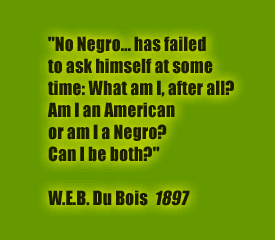




 |
 |  |
 |
 |
||||||||||
|

Week VI. {Topics}{Personalities}{Readings}{Multimedia}
The New NegroTOPICS >>> African-Americans in the Progressive
Era
The state of Black America:
The Harlem Renaissance:
Political Militancy in the Twenties: PERSONALITIES >>> W.E. B. Du Bois, author,
The Souls of Black Folk, editor, The Crisis, William Monroe Trotter Ida B. Wells, editor, Free Speech and Headlight; anti-lynching activist and prominent black feminist Anna Julia Cooper, author, A Voice from the South--1892; early black feminist Hallie Q. Brown, prominent public speaker, Wilberforce College professor Gertrude Bustill Mossell, contributing editor, New York Age; author, The Work of the Afro-American Woman, 1894. Mary Church Terrell, president, National Association of Colored Women, 1896; DC School Board, 1895-1906; prominent black feminist, liberal Republican leader Mary McLeod Bethune,
educator, founder of Cookman College, Florida, 1905; Problems of Racism
in the Women's Suffrage Movement, 1890-1920 READINGS >>>Giddings, When and Where I Enter, Chapters VIII, IX, X and XI, pp. 135-197. Juan Williams, Eyes on the Prize: America's Civil Rights Years, 1954-1965, Chapter I, "God Bless the Child: The Story of School Desegregation," pp. 1-35. Marable and Mullings, eds.,
Let Nobody Turn Us Around,
Section Two, Number 17, pp. 230-233; Section Three, "Introduction," pp.
237-242, and Numbers 1-8, pp. 242-295. MULTIMEDIA >>> Music: Poetry: Langston Hughes, "I, Too," "Harlem," "The Negro Speaks of Rivers." Films: Clip of Rosewood
Ð depicts racist attack against all-black Florida town in 1920s.
|